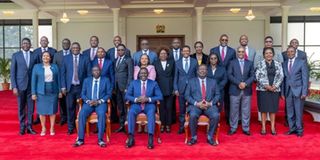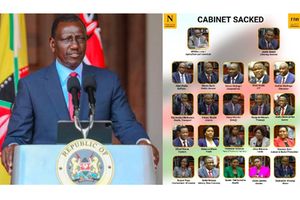
Nominated MP John Mbadi. He warned President William Ruto in 2022 that his cabinet would fail.
On the morning of October 26, 2022, the National Assembly was debating the report of the House Appointments Committee on the vetting of 24 people nominated by President William Ruto for Cabinet.
The list of nominees vetted by MPs and recommended for approval, with the exception of one rejection, included allegations of integrity issues ranging from murder, rape and corruption, among others.
When he caught the eye of the Speaker, Moses Wetang'ula, who was in the chair at the time and given the opportunity to speak on the motion, the nominated MP, John Mbadi (formerly Suba South MP and Minority Leader in the National Assembly), made remarks that startled the House and which may have just come to pass.
Read more: Five Cabinet nominees divide committee
Mr Mbadi was bold.
“We have a choice to make; reject over 60 per cent of these names or give President Ruto his skunk. Let us not interfere with it. We will give it to him. He asked for it. Let us give him his Cabinet,” said Mr Mbadi as he dismissed some of the President’s nominees over integrity issues.
“We know he will run the government from the State House. These are not people who can run a government, apart from a few who are not even more than eight. The rest are incompetent, unqualified and have integrity issues. They cannot deliver this country from where it is to the next level that we want,” Mbadi added.
Committee on Appointments
The Committee on Appointments chaired by Mr Wetang'ula had recommended to the House that all the 23 nominees be approved for appointment, with the exception of Ms Penina Malonza, who failed to convince the committee that she was the right person for the job of CS. Mr Mbadi was not finished with the nominees.
He reminded the House that Chapter Six of the Constitution is higher than a court of law. “We are not a court of law. We approve you in this House based on your capacity to hold office,” the nominated MP had said.
This even as he wondered why Ms Malonza “is being disapproved simply because she could not talk properly in the committee.”
“You are telling me that a person who was mentioned in corruption matters and whose name was brought here by the President is as clean as cotton. Let us be serious.”
But even as the majority of MPs made their position clear on some of the nominees, they gave a glowing tribute to the nomination of immediate former Speaker Justin Muturi for the position of Attorney General and Garissa Township MP Aden Duale.
On the same morning, the House would approve the nominees for appointment, including overturning the recommendation to reject Ms Malonza, who was subsequently appointed by the President.
Mr Mbadi's grievance was that some of the people nominated to cabinet had cases before the courts for serious crimes such as murder and theft of public funds.
Others had civil matters to deal with in the courts. Cometh the time cometh the hour.
Corruption, opulence and arrogance
On Thursday, President Ruto dropped a bombshell when he sacked his entire cabinet of 24 men and women after the government became so unstable, largely due to deadly anti-government protests fuelled by proposed punitive measures and a cabinet riddled with every unpopularity in the book - corruption, opulence and arrogance.
In short, it was a cabinet that exposed the soft underbelly of government - the insensitivity to the needs of the people who are overtaxed for services not rendered.
This is even though some of the nominees had dubious antecedents whose unpopularity came to light during the vetting process.
For example, affidavits were submitted to Parliament against the nomination of some of the individuals to the cabinet.

President William Ruto with members of his cabinet at State House, Nairobi.
Mr Davis Chirchir, nominated for Energy, was mentioned in an affidavit by Ms Sheila Masinde, the Executive Director of Transparency International (TI) Kenya, for his role in the Chicken-gate scandal during his time as a commissioner at the Interim Independent Electoral Commission (IIEC).
The affidavit named him as one of the IIEC officials who received kickbacks from a UK-based printing company.
Mr Chirchchir told the vetting committee that he had fully co-operated with the EACC, recorded a statement and that no adverse recommendation had been made against him.
He also said that he was not found guilty at the end of the investigation and that those found guilty were charged to court and the case is still pending.
Mr Mithika Linturi was also named by Ms Masinde as having been accused and charged with attempted rape in January 2021.
Another petition linked him to accusations of inciting Kenyans to violence during a political rally in Eldoret, although the case was withdrawn.
On the attempted rape charge, Mr Linturi said the Chief Magistrate's Court had discontinued the case against him in accordance with the Criminal Procedure Code.
National Treasury
Prof Njuguna Ndung'u, the then-nominee for National Treasury, was accused in affidavits to the committee of irregularly awarding a Sh1.2 billion security tender while he was the Central Bank of Kenya (CBK) Governor in 2014.
He was also implicated in the irregular sale of the Grand Regency Hotel, now Laico Hotel.
Also read: What next for leadership with integrity?
However, he told the vetting committee that he had challenged the matter of the irregular award of the security tender in court and the charges against him were quashed.
On the irregular sale of the Grand Regency Hotel, he said he was an agent of the government as it was a government-to-government deal.
An affidavit was also filed against the nomination of Ms Aisha Jumwa for appointment as Cabinet Secretary for the Public Service on the grounds that she had integrity issues and was therefore unfit to serve because of the ongoing criminal case against her.
She had also been charged with murder, but the charges had been withdrawn. She told the committee that the graft charges against her were politically motivated.
Dr Alfred Mutua, then nominated for Foreign Affairs, faced allegations of abuse of office including misappropriation of public funds and irregular procurement of vehicles for the county government during his tenure as Machakos County Governor from 2013 to 2022.
He denied the allegations. Prof Kithure Kindiki, then nominated for Interior, was confronted with questions on the proceeds from the National Youth Service (NYS) paid to his law firm.
However, he told the committee that the Sh500,000 payment was made by a friend - Kipchumba Murkomen, who was also nominated for Roads and Transport - as repayment of a debt and that he was never paid directly by the NYS.
Mr Murkomen was later acquitted by the court of his involvement in the NYS scandal.
This was after the court quashed the recommendations of the National Assembly's Public Accounts Committee (PAC).









